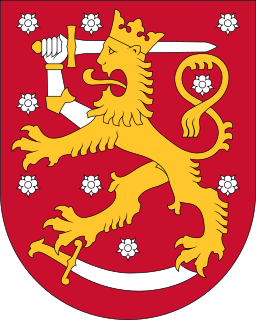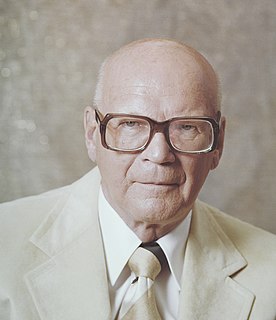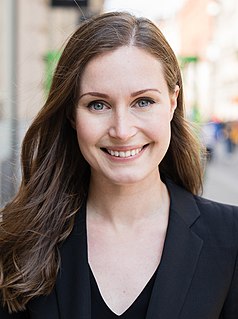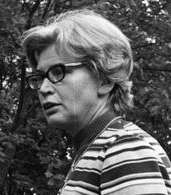
The politics of Finland take place within the framework of a parliamentary representative democracy. Finland is a republic whose head of state is President Sauli Niinistö, who leads the nation's foreign policy and is the supreme commander of the Finnish Defence Forces. Finland's head of government is Prime Minister Sanna Marin, who leads the nation's executive branch, called the Finnish Government. Legislative power is vested in the Parliament of Finland, and the Government has limited rights to amend or extend legislation. Because the Constitution of Finland vests power to both the President and Government, the President has veto power over parliamentary decisions, although this power can be overruled by a majority vote in the Parliament.

Urho Kaleva Kekkonen, often referred to by his initials UKK, was a Finnish politician who served as the eighth and longest-serving president of Finland from 1956 until 1982. He was the third and most recent president from the Agrarian League/Centre Party. As head of state for nearly 26 years, he dominated Finnish politics, held a large amount of power, won his later elections with little opposition and has often been classified as an autocrat. Nevertheless, he remains a respected figure.

Taisto Kalevi Sorsa was a Finnish politician who served as Prime Minister of Finland three times: 1972–1975, 1977–1979 and 1982–1987. At the time of his death he still held the record for most days of incumbency as prime minister. He was also a long-time leader of the Social Democratic Party of Finland.

Martti Juhani Miettunen, was a Finnish politician who served twice as Finland's prime minister, from 1961 to 1962 and again from 1975 to 1977.

The prime minister of Finland is the head of the Finnish Government. The prime minister is Finland's head of government and is formally ranked third in the protocol after the president of Finland and the speaker of the Parliament. Finland's first prime minister was Pehr Evind Svinhufvud, was appointed on 27 November 1917, just a few days before the country became independent.

Naantali is a town in southwestern Finland, and, as a resort town during the summer, an important tourist centre of the country. The municipality has a population of 19,454 (31 March 2021), and is located in the region of Southwest Finland, 14 kilometres (8.7 mi) west of Turku.

Keijo Antero Liinamaa was a Finnish lawyer and politician who served as caretaker Prime Minister of Finland from June to November 1975.
Finnish national income policy agreements or comprehensive income policy agreements are tripartite agreements between Finnish trade unions, employers' organizations, and the Finnish government. They are policy documents covering a wide range of economic and political issues, such as salaries, taxation, pensions, unemployment benefits, and housing costs. They represent collective bargaining taken to its logical maximum, reaching virtually all wage-earners. Their enforcement is made easier by the universal validity of collective labour agreements. However, they are voluntary agreements and are not considered government legislation, i.e. they do not represent central planning of the economy.

FF Jaro is a Finnish football club, based in the bilingual town of Jakobstad. It currently plays in Ykkönen. Home matches are played at the Jakobstads Centralplan.
Parliamentary elections were held in Finland on 21 and 22 September 1975.
Kotha Raghuramaiah was an Indian politician who served as a Member of Parliament and Cabinet Minister of Parliamentary Affairs.
Keijo is a masculine Finnish given name. Notable people with the name include:

The first cabinet of Kalevi Sorsa was the 56th government of Finland. The cabinet's Prime Minister was Kalevi Sorsa. The cabinet was in office from 4 September 1972 to 13 June 1975.
Arvo Rytkönen was a Finnish Ambassador and Minister of Trade and Industry and one of the ministers in the ministry of foreign affairs in Liinamaa caretaker cabinet.
Alec Mikael Aalto was a Finnish diplomat. In the Foreign Ministry, he started in 1979 and served as Finland's Ambassador in Austria (1991–1995), Italy (2003–2006) and Sweden in 2006–2010 until his retirement.
Events in the year 2021 in Finland.

Veikko Ihamuotila was an influential Finnish agriculture sector leader, administrator and one-time government minister.

Sylvi Inkeri Anttila was a Finnish jurist and criminologist who was the Minister of Justice of Finland during the caretaker government of Keijo Liinamaa in 1975. She studied criminal law at the University of Helsinki, becoming the first woman in Finland to receive a doctorate in law in 1946 and the first female professor of criminal law in Finland in 1961.

Alli Kyllikki Lahtinen was a Finnish politician who was the Minister of Social Affairs and Health from 1971 to 1972 and from June to November 1975.












